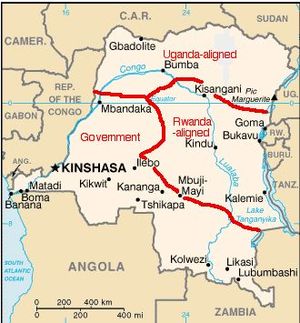|
The
Congo War
(1998-Present) Map
of the Congo War circa 2003.
Red
lines indicate approximate zones of
control in 2003 ALTERNATE
NAMES FOR THE CONGO
WAR
The
Great Lakes War Africa's
First World War BELLIGERENTS
OF THE CONGO WAR: 1.
Mai-Mai militia of eastern Kivu region
of Congo 2.
Rwandan Hutu interahamwe (remnants of
the old Rwandan Hutu army) 3.
Burundi's Hutu Forces pour la d'fense
de la democratie (FDD) -- Rebels
against the Burundi
government 1.
The Congolese Liberation
Movement--supported by
Uganda 2.
Rassemblement congolais pour la
democratie (RCD)--supported by
Rwanda 3.
The March 23 Movement
(M23) DATES
OF THE CONGO WAR BEGAN:
August 1, 1998 ENDED:
Ongoing TYPE(S)
OF CONFLICT: Civil
War & Foreign Intervention
CONFLICTS
RELATED TO THE CONGO WAR CONCURRENT:
(Related conflicts occurring at the
same time) SUCCESSOR:
(Related conflicts that occur
later) CAUSES
OF CONGO WAR: CONSEQUENCES
OF THE CONGO WAR: 1. The
deaths of over a million people
2. The
dependence of the Congo government under
the second President Kabila, on foreign
forces to keep it in power CONGO
WAR CASUALTY FIGURES: Estimates
place the number of dead (the vast
majority civilian) at somewhere betweeen
one million and two and a half million
dead in Congo. Most of the dead were the
result of famine and disease brought on by
the war. SOURCES
ON THE CONGO WAR: CIA
Factbook on Country or
conflict
Click on the country name at this
site. One
World Special Reports:
Congo CASUALTIES
OF WAR: Civilians, Rule of Law, and
Democratic Freedoms Eastern
Congo Ravaged: Killing Civilians and
Silencing Protest Rwanda
to pull troops out of DR
Congo Despite
a cease-fire, Congo war
escalating--Article
from the Philadelphia Inquirer Return
to the killing fields?: A border war is
now the most serious threat to
peace...--
Article in the Daily Mail &
Guardian. Rebels
seize east Congo army camp, thousands
flee
Lee, R.
"The Congo War (1998-Present)" http://www.historyguy.com/congo_war.htm "The
History Guy" is a Registered
Trademark. Contact
the webmaster |
Historyguy.com Search
Engine
Trending on
Historyguy.com Now: Join the
FREE Historyguy Update list. Receive regular
updates delivered right to your
inbox.
Email
Marketing You Can Trust Outside
Links on the Wars in the
Congo CIA
Factbook on Country or
conflict
Click on the country name at this
site. One
World Special Reports:
Congo CASUALTIES
OF WAR: Civilians, Rule of Law, and
Democratic Freedoms Eastern
Congo Ravaged: Killing Civilians and
Silencing Protest Rwanda
to pull troops out of DR
Congo Despite
a cease-fire, Congo war
escalating--Article
from the Philadelphia Inquirer Return
to the killing fields?: A border war is
now the most serious threat to
peace...--
Article in the Daily Mail &
Guardian. Site
Map--revision
in progress |

